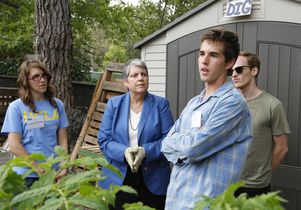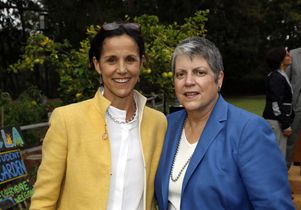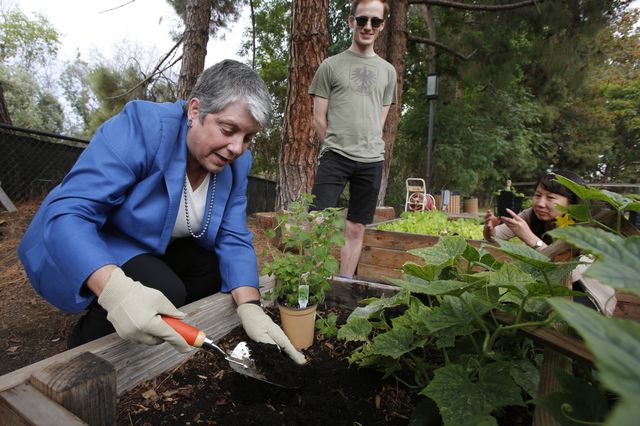University of California President Janet Napolitano today announced a major initiative intended to marshal resources across the UC system to address global food needs, concluding a series of events at a student-run garden on the UCLA campus.
Signaling a commitment by Napolitano and the university’s 10 chancellors, the president unveiled the UC Global Food Initiative over the course of three events, starting at a school nutrition program in Berkeley, followed by a presentation to the California State Board of Food and Agriculture in Sacramento, and finally at the UCLA community garden in the Sunset Canyon Recreation Center.
"It is a commitment to apply a laser focus on what UC can do as a public research university, in one of the most robust agricultural regions in the world, to take on one of the world’s most pressing issues," Napolitano said.
► More photos on UCLA Newsroom's Facebook page
"This initiative," she said, "will expand the UC tradition of innovative research. In my early time on all 10 UC campuses, it became clear that some of the most exciting research often occurs when multiple disciplines come together around a single research topic.

"Multidisciplinary research for this critical challenge is paramount. And we will leverage this research to address public policy issues on sustainable production and distribution of healthy food at both the national and international levels."
Napolitano said the initiative will span all other elements of day-to-day life at the university as well, including operations, curriculum and public service.
It will build on existing campus work such as UCLA’s Healthy Campus Initiative, creating a successful model that can be replicated across the UC system through curriculum, operations, policy, research and public service, she said.
In lauding UCLA’s food and nutrition efforts, Napolitano stressed that a major thrust of the initiative will be to share best practices across the 10-campus system and into California, the nation and, ultimately, the world.
President Napolitano was joined at UCLA by Executive Vice Chancellor and Provost Scott Waugh; Wendy Slusser, associate vice provost for the UCLA Healthy Campus Initiative; students who manage the garden; and Los Angeles and Riverside school district officials.
UCLA’s initiative is an integrated effort aimed at making the campus the healthiest university in the country, promoting health and wellness of students, faculty and staff, and helping other communities achieve the same objectives. The Healthy Campus Initiative was envisioned and supported by philanthropists Jane and Terry Semel. Jane Semel was present for the announcement.
Prior to the announcement, Napolitano toured the garden with members of the student group DigUCLA. She also planted an oregano plant and learned about gardening basics from the students.
"You’re making Italian food right in the garden," she quipped, while perusing raised beds filled with tomato, squash, cucumber, basil and tarragon. "Add a little olive oil and you have dinner."
Slusser said that she was excited to learn that the Healthy Campus Initiative served as a starting point for what has grown into a larger and stronger UC-wide effort. "On a personal note, the initiative is bringing me back to my roots since food has been the driving force in my medical and academic career, and also my father is a fourth-generation California rancher. So thank you, President Napolitano, and thank you to all our UCLA and community partners for working so hard in making us stronger together to promote health, wellness and happiness through food."
Among UCLA Healthy Campus Initiative efforts are:
- Monthly farmers markets held on campus, and a student food co-op.
- Research projects assessing topics such as childhood obesity, food culture, seed-saving, global food security and the effects of climate change.
- A biodynamic fruit and vegetable garden that will provide fresh produce to facilities near UCLA residence halls and serve as a composting location for restaurant food scraps.
- Overhauling food offerings in the UCLA Health System, including the elimination of fried foods, reducing salad bar prices through increased soda prices, and working toward zero waste to landfill by 2020.
"At UCLA, we have a long history of visionary research, community partnerships and campus operations that have a real-world impact on society’s emerging challenges," Waugh said. "The UCLA Healthy Campus Initiative provides an umbrella for our multifaceted efforts to promote health and prevent disease both on and off campus. Our work dovetails perfectly with the new UC Global Food Initiative, and we are thrilled to partner with President Napolitano and our sister campuses on this systemwide priority, which serves and strengthens our mutual goal of benefiting the public."

The University of California is also exploring ways to expand partnerships with public school districts on developing healthy and sustainable dining options for K-12 students. At UCLA, faculty, students and staff collaborate with the Los Angeles Unified School District’s food services and medical staff on research and programs to promote healthy eating for the school district’s 640,000 students. This work may serve as a model for other UC campuses and nearby schools.
Emphasizing that student engagement is key, Napolitano announced, as one of her first actions, the funding of three $2,500 President’s Global Food Initiative Student Fellowships to be awarded on each campus to undergraduate or graduate students. The fellowships will fund student research projects or internships.
"It’s definitely good that she’s getting student involvement," said UCLA environmental science major Ian Davies, who led Napolitano's garden tour and serves as garden coordinator for DigUCLA. "Students have a lot of great ideas and it’s cool that there’s money to develop some of them."
Among other early efforts to be undertaken as part of the initiative:
- Internally, campuses will heighten their collective purchasing power and dining practices to encourage sustainable farming practices, and model healthy eating and zero food waste; food pantries and farmers markets that exist on some campuses will be spread to all 10.
- Food issues will be integrated into more undergraduate and graduate courses, catalogues of food-related courses will be developed, and demonstration gardens will be made available on each campus to increase opportunities for students to participate in experiential learning.
- Data mining of existing information will be deployed to help develop insights and action plans for California agriculture and responses to climate change.
New policies will be enacted to allow small growers to serve as suppliers for UC campuses.





